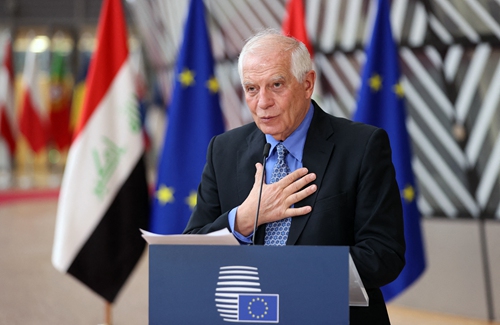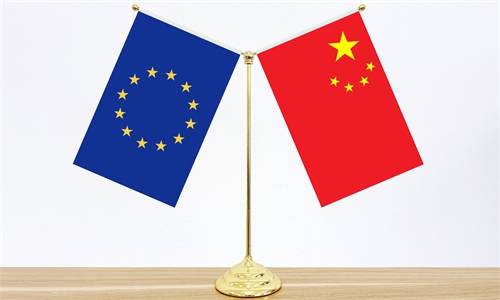Call of top EU diplomat for European navies to patrol the Taiwan Straits 'very dangerous'
Europe divided on the Taiwan question; Borrell's remarks a retrogression of EU's stance on it: experts

EU High Representative for Foreign Affairs and Security Policy Josep Borrell Photo: IC
The latest remarks by the EU's top diplomat Josep Borrell, who called for European navies to patrol the Taiwan Straits, caused huge controversy on Sunday as some Chinese observers said the comments are "extremely dangerous" and signal "a retrogression" of the EU's stance on the Taiwan question following the recent G7 meeting during which the US tried to pressure its allies to take a tougher position on the matter.
European navies should patrol the disputed Taiwan Straits, Borrell wrote in an article published in the French newspaper Journal Du Dimanche, saying that the Chinese island concerns the EU economically, commercially and technologically, according to media reports on Sunday. He called for European navies to patrol the Taiwan Straits to "show Europe's commitment to freedom of navigation" in this crucial area.
The remarks came after Borrell addressed the European Parliament debate about EU-China relations on Tuesday, during which the head of the EU's foreign policy stressed the need for a united EU approach to China. In recent weeks, the EU has witnessed a wide debate following comments from French President Emmanuel Macron in the wake of a visit to China who called for the EU to reduce its dependence on the US and avoid getting dragged into a confrontation between China and the US over the Taiwan question.
While some European officials such as European Council leader Charles Michel welcomed Macron's remarks, Borrell's call for European navies to patrol the Taiwan Straits apparently points to an opposing sentiment, reflecting that debate remains intense within the EU and the influence of the US still lingers, some experts said.
"Borrell's call can be seen as a way of counterbalancing Macron's remarks, showing that the EU hopes to make its so-called unified foreign policy override the policies of its member states," Cui Hongjian, director of the Department of European Studies at the China Institute of International Studies, told the Global Times on Sunday.
Such divergences point to a complex power struggle among EU institutions, especially over who has the power to formulate the bloc's foreign policy, Cui said. But he said it is unlikely that Borrell's remarks will become actual policy given the divergences between the Council of Europe, European Commission and the European Parliament toward China.
"But we should remain vigilant as those remarks showed that some people inside Europe echo the US, seeking to manipulate the Taiwan question," Cui said.
Some Chinese experts believe that this is a military provocation to China's internal affairs that could lead to severe consequences.
"Those remarks were made following the latest G7 meeting during which the US-led West and NATO coordinated again on security issues such as the Russia-Ukraine conflict and the Taiwan question," a Chinese expert on European affairs, who preferred not to be named, told the Global Times on Sunday.
During the G7 foreign ministers' meeting, held from April 16-18 in Karuizawa, Japan, the foreign ministers from the group took a tough stance on Taiwan question, which was then echoed by Borrell's remarks, so it is likely the US imposed a certain influence on the overall tone of the comments made, the expert said.
"It shows that the EU's China policy is moving a step further into a tough direction. On the Taiwan question, it can be seen as a clear setback to the EU's one-China policy and a military provocation to China's internal affairs that could lead to serious consequences," he said.
The G7 foreign ministers' meeting "reaffirmed" the importance of "peace and stability" across the Taiwan Straits. A senior US official also said the group "sees eye to eye" on the need to stand up to any Chinese "coercion" or efforts to exert control in the Taiwan Straits, according to Reuters.
"Borrell's remarks are very dangerous, revealing ill-intentioned attempts to turn the Taiwan question into an international topic," Li Haidong, a professor at the Institute of International Relations at the China Foreign Affairs University, told the Global Times on Sunday.
Europe should not worry about so-called smooth trade routes in the Taiwan Straits being hindered in any way by the Chinese mainland, Li said. "In fact, the mainland is always the biggest stakeholder to ensure lasting stability and prosperity in the Taiwan Straits and will promote the smooth development of regional trade to the greatest extent."
Borrell said in the article that the Taiwan Straits "is the most strategic strait in the world, especially with regard to trade: we must be present there through freedom of navigation operations," according to media reports.
In fact, any vessels engaged in normal trade activities are never hindered in any way but if European navies patrol the Straits, it will surely escalate tensions in the region and send shockwaves to trade activities between Europe and China, as well as between Asia-Pacific countries, Li said.
Chinese experts stressed that the one-China policy is a political fundamental for China-EU relations, and as the official in charge of the EU's foreign policy, Borrell should be cautious about his remarks on whether it is necessary to drag Europe into a major strategic confrontation with China.
In recent years, the US has continued to incite trouble in the Asia-Pacific region, especially on the Taiwan question. If Europe sends troops to patrol the Taiwan Straits, it will mean that Europe is willing to serve as a servant of the US, creating crises, turmoil and division in the Asia-Pacific, Li noted. "In this case, Europe would be a disruptive factor in the Asia-Pacific region and meet widespread resistance."


